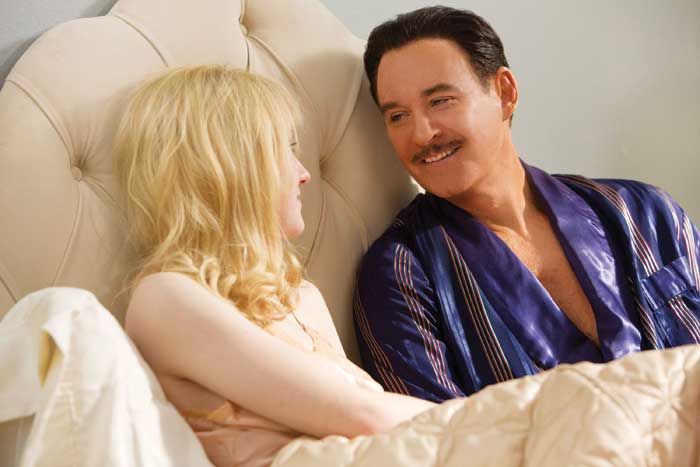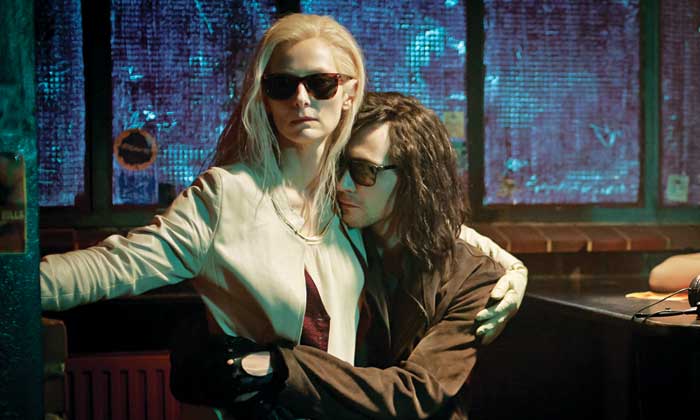Each month, the Indie Prof reviews a current film in the theater and a second film that is available on DVD or an instant-streaming service. Follow “Indie Prof” on Facebook for updates about film events and more reviews.
The Last Robin Hood (2013)

Scene from The Last Robin Hood
“In like Flynn.” You surely have heard the saying, but do you know where it comes from? The origin points back to Errol Flynn, the great Hollywood actor from the 30s to the 50s who was most famous for The Adventures of Robin Hood (1938). Flynn was a charismatic and charming actor who was notorious for his off-screen partying and romances. To be “in like Flynn,” meant that you were as cool, charming, and smooth as the great actor. But Flynn had a dark side: drunkenness, womanizing, and scandal. In 1942, he was accused of the statutory rape of two underage girls. He was eventually cleared of the charges, but his reputation was ruined, and the charge remained a scarlet letter for him.
This newly released film tells the story of a fifty-something Flynn (Kevin Kline) and his teenaged lover, Beverly Aadland (Dakota Fanning). Their romance was covered by the tabloids and became sensational news in the 50s; the story was further inflamed by Beverly’s publicity-hungry mother, Florence Aadland (Susan Sarandon), who used the platform as a vehicle for notoriety. The film tells their story without judgment, but the obvious takeaway is the desire for fame and the price it exacts on the many players.
The performances are the draw of the film: Kline gives another star turn and inhabits the famous persona of Flynn with strength and steel. Fanning is perfect in the role of the young woman caught up in a maelstrom that is only partly of her own making. And Sarandon is her usual screen-stealing self, inhabiting a character who so desires fame that she fails to see the destruction she is causing. The directors stay out of the way of the characters and smartly let them drive the bus.
Overall, this is a strong film with a fascinating subject and confident performances.
You will like this film if you enjoyed Chaplin, Nixon, and/or The Aviator. Starts Sept. 5 at the Esquire Theater.
Only Lovers Left Alive (2014)

Scene from Only Lovers Left Alive
This is the best film I’ve seen this year.
The 19th film from the best director you (probably) never heard of, it is the most accomplished work in the wonderful career of Jim Jarmusch, the foremost American Independent director. Jarmusch’s career spans four decades, and he has made films his own way: never for a studio, always retaining final cut rights, and remarkably versatile in style and form. Only Lovers Left Alive is no exception.
The film concerns two modern vampires, Eve (Tilda Swinton) and Adam (Tom Hiddleston), who have been lovers for several hundred years. Eve lives surrounded by books in Tangiers while Adam lives surrounded by musical instruments in an abandoned Detroit house. When Eve finds Adam particularly sullen on a phone call, she flys to Detroit (all night flights, of course) to be with him. The two are so leery of contemporary society that they both obtain their blood from doctors—clean and pure. Their evening treat is a Type-O popsicle and a flute of pure blood.
The narrative is not particularly intricate, but the filmmaking and the characters are mesmerizing. The pacing of the film is as languid as the characters, and the cinematography swirls and creeps through the film as the characters do through life. We sit for long periods of time as they talk, sleep, or drive around Detroit (which serves as a perfect setting for a decaying city well past its prime). The allegories are delicious.
The acting is delightful—both Swinton and Hiddleston ARE their characters, and their relationship seems as natural as the passing of time. These are people who have seen everything and remain aloof from the rest of society. It is so refreshing to see a genre film (vampires) that gets it: if you were alive for thousands of years, you likely would have read everything ever written and/or become the greatest musician in the world. And you might find society quite boring and uninspired. The actors inhabit these traits effortlessly, so sit back and relish the performances.
One review of the film said that Jarmusch “updated the genre.” I argue that he actually just gave the genre an intelligent and thoughtful injection: there are no swooning teens or bloodthirsty crazies here, only a couple in love who have seen it all. Doesn’t that make sense for a vampire movie?
You will like this film if you enjoyed Inside Llewyn Davis, Byzantium, and/or Nebraska. Available on Netflix and at the Redbox.
Vincent Piturro, Ph.D., teaches Cinema Studies at Metropolitan State University of Denver. He can be reached at vpiturro@msudenver.edu.




0 Comments